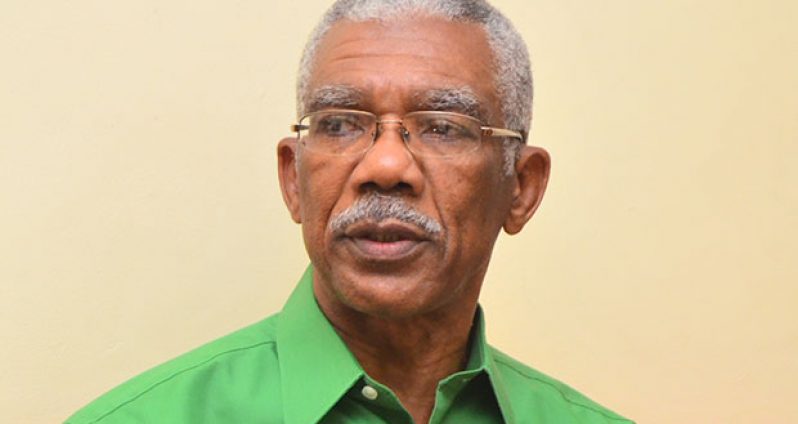“GUYANA does not need more drug-rehabilitation programmes. It needs drug eradication programmes.”
This observation was made by Leader of the Opposition, Brigadier (Ret’d) David Granger, who contends that despite the work being put in by the Salvation Army’s Drug Rehabilitation Programme, Guyana continues to see a rapid increase in drug addiction.
Mr. Granger made these remarks as he delivered greetings to the Guyana Division of the Salvation Army during a Civic Welcome in celebration of the Division’s 120th anniversary last Thursday. The venue was Citadel Headquarters, South Road and Alexander Streets.

He acknowledged the work of the Salvation Army in the area of rehabilitation of substance abusers, but feels that the Salvation Army’s focus in this area is “sucking the oxygen” out of its other social and educational programmes.
Said Mr. Granger: “I believe that your work in that field is sucking the oxygen out of your other programmes. Your focus on drug rehabilitation is well known, but in my view need not be necessary,” he told officers of the Salvation Army, adding that, “You only need drug rehabilitation if you have a drug problem.”
To this end, he pleaded with fellow Guyanese and with the government to do more to prevent drugs from coming into our country, fearing that the Army’s intense focus on this programme could rob the other programmes of resources and personnel needed for their execution.
Mr. Granger commended the work of the Salvation Army in Guyana over the last 120 years, acknowledging its efforts at evangelism; its education and social programmes, and particularly its local drug- rehabilitation programme.
But given the Army’s focus on the drug- rehabilitation programme, seemingly at the expense of other social programmes, there could be an impending danger, said Mr. Granger.
The Salvation Army continues to work assiduously, has reformed hundreds of lives, previously on the brink of disaster, re-incorporated them into society and has been the recipient of a Medal of Service (MS) for its work in drug rehabilitation. It also receives an annual subvention from the government of Guyana to assist in running the programme. However, Mr. Granger has noted that Guyana continues to see a rapid increase in drug addiction.
On this note, Mr. Granger contended, “Guyana does not need more drug Rehabilitation programmes. It needs drug- eradication programmes and this starts with the government. It starts with enforcing the whole National Drug Strategy Master Plan and addressing the issues raised every single day by the United States Department of International Narcotics Control Strategy Report.”
He said drug abuse, which is not an act of God, but a human invention and can be ended by human intervention.
He however made it categorically clear that: “Guyana needs the Salvation Army, but it also needs the other services which the Salvation Army could be performing if its resources and personnel were not tied up with drug rehabilitation.”
With a heart of gratitude for the contribution of the Salvation Army to the development of Guyana, the Opposition Leader stated: “I thank you very much for the work you’ve been doing over the last 12 decades. I thank you for your social programmes; for your nursery schools at Bartica; for your Men’s Hostel and Women’s Hostel and other social programmes.”
And in concluding, he challenged the government and people of Guyana: “I plead with you Guyanese; I plead with you the government to do more to prevent drugs from coming into our country, so we don’t have a drug problem and the Salvation Army would be allowed to[do] God’s work in removing poverty and developing our children so they could be allowed to grow up and live Godly lives.”
Dr. Ramsammy’s take: Meanwhile, Agriculture Minister, Dr. Leslie Ramsammy who brought greetings on behalf of His Excellency, President Donald Ramotar, said The Salvation Army’s work in the rehabilitation of substance abusers in Guyana is in fact a progressive approach to a global problem.”
He unreservedly acknowledged and lauded the contributions of the Salvation Army and the extensive service it has provided to our people and across the globe.
“Today, as we celebrate the 120th anniversary of the Salvation Army in Guyana, we must take time to acknowledge their contribution to our development in Guyana,” Dr. Ramsammy said.
Noting that all of The Army’s work in Guyana contributes to the betterment of our people, Dr. Ramsammy added with firm conviction, “Indeed, its work, in particular in addiction treatment must be recognised. The Salvation Army’s work in the rehabilitation of substance abusers in Guyana, in fact, is a progressive approach to a global problem.”
Dr. Ramsammy further made the point that addiction is not a crime, but a malady. “Unfortunately, around the world we treat addiction as crime, and too many people die in prison for addiction and not being offered the treatment they need.”
He said that he is especially privileged to have had the opportunity to work with the Salvation Army in part of its work in our country and can attest to the high quality of the Salvation Army’s work in the treatment and rehabilitation of substance abusers.
“As a public health professional, I have worked on local and international platforms to ensure that we view this malady of addiction, a growing global problem with policies that recognise it as a malady and not just as a crime,” the former health minister said.
Sounding a clarion call that treatment must be made universally accessible for all those who are addicted with this malady in Guyana and around the world, Dr. Ramsammy, affirmed, “Sisters and brothers, we must work unitedly to address this particular issue and we must address all of the other deficits we have in terms of our humanity.”



.jpg)








